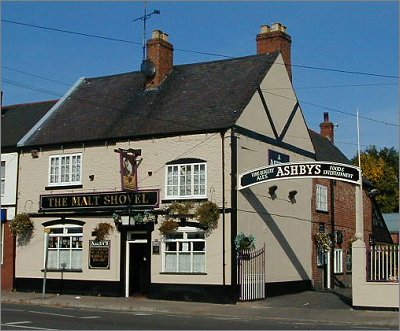"The Malt Shovel" Spon End
6 posts
• Page 1 of 1
"The Malt Shovel" Spon End
If the posters in its windows are to be believed this is now to be used as health advice centre. All traces that it was once a pub have now been removed.
-

dutchman - Site Admin
- Posts: 57828
- Joined: Fri Oct 23, 2009 12:24 am
- Location: Spon End
Re: "The Malt Shovel" Spon End
Dutchman, was that place known as "Ashby's" a few years back?
Of course it'll fit; you just need a bigger hammer.
-

rebbonk - Posts: 72534
- Joined: Thu Nov 12, 2009 6:01 am
Re: "The Malt Shovel" Spon End
Not that I'm aware of Rebbonk alhtough local historian John Ashby does seem to have a special fondness for the place.rebbonk wrote:Dutchman, was that place known as "Ashby's" a few years back?
-

dutchman - Site Admin
- Posts: 57828
- Joined: Fri Oct 23, 2009 12:24 am
- Location: Spon End
Re: "The Malt Shovel" Spon End

Thought in the dim distant past I had heard of this place.
The publican (Nigel Ashby) was involved in a "daring" adventure getting his in laws out of some war torn place. Serbia I think.
It would possibly make an interesting story.
Still very sad that another pub has gone though. - I'm now off out to do my bit for the local pub trade!
Of course it'll fit; you just need a bigger hammer.
-

rebbonk - Posts: 72534
- Joined: Thu Nov 12, 2009 6:01 am
Re: "The Malt Shovel" Spon End
There certainly seem to be quite a few in Earlsdon. I'm very dubious about the location of this one and whether there will be enough local interest to support it?flapdoodle wrote:How many more health centres do we need? They seem to be a growth industry at the moment.
-

dutchman - Site Admin
- Posts: 57828
- Joined: Fri Oct 23, 2009 12:24 am
- Location: Spon End
Re: "The Malt Shovel" Spon End
Memories of the Malt Shovel in Spon End
Rustling through a pile of papers and old photos, Judith Bramwell becomes very passionate when talking about the role of pubs in our community.
In an era of binge drinking and vodka jellies, she comes from a time when the local ale house had a very different part to play in daily life.
It was in the Malt Shovel, and dozens of other pubs like it, where the history of our great city was passed on and re-written.
Her great grandfather was Thomas North, who came from a family of local tenant farmers.
At the age of 33 he ventured to Coventry to make his fortune and in 1863 took charge at the Dyers Arms pub in Spon Street. The Dyers Arms dated back as far as 1822 and was demolished to make way for the ring road in the 1950s.
“Farming wasn’t for him,” she insists.
“It was hard work and there was no money in it. He came in to Coventry because he had a real business brain.”
This move in to the pub trade would see Judith’s family eventually own pubs and businesses throughout Spon End and the city as a whole.
Thomas North was tenant landlord for the brewery owners of the Dyers Arms until 1871 when he bought the Malt Shovel for just £751. He ran the famous pub until his death six years later, aged 47.
As well as brewing its own beer, the Malt Shovel had stables for 50 horses at the back of the pub.
“The Malt Shovel was an inn and in those days you had an obligation to feed and stable the horses as well as feed the passengers,” Judith says.
“They used to brew three times-a-week. The kids even ate the sugar with the alcohol in. They took some in to school once and got the other kids drunk.
“It got my grandad in to a lot of trouble – but they were immune to it.”
Judith’s grandad was Harry Causer. He had married Thomas North’s daughter, Annie, and took over the pub after the landlord’s death.
The Causer family owned Spon End businesses Causer’s Bakery, Causer And Son Undertakers, a coal firm, a haulage business and a horse-drawn taxi service.
They also owned city pubs – The Globe and the O’Rare Ben Johnson.
Under Harry and Annie’s stewardship the Malt Shovel thrived.
“Harry was a bit of a rogue but as long as he ran the pub well they got on with him. They brewed and they had the customers – I don’t think they saw a bad time really.
“Pubs were the lifeline. Historically people didn’t drink tea years ago – people drank beer. Children would drink watered down beer.
“Pubs were where we met. Pubs were where we did business. The whole idea of the pub was as a family place.”
This was long before Spon Street was sliced apart from Spon End with the building of Coventry’s ring road.
Annie Causer gave birth to Judith’s father, Frederick, and his three siblings in the old pub. They grew up there.
“Pubs in Spon End were special. Behind each pub were courts of about 15 to 20 houses. Spon Street and Spon End complement each other. A lot of our history going back to the 1700s is actually here.”
When Judith was born in 1936, her father’s Causer And Son Undertakers business was still operating from the premises next door to the Malt Shovel.
“When we were young growing up in Spon End there was a plaza, a cinema, a post office and a whole host of individual shops alongside the pub.
“Everyone knew each other and mixed socially. The Malt Shovel was the hub of Spon End. It had been there a long time and people were used to using it.”
NB: The Dyers Arms in Spon Street is not to be confused with the Old Dyers Arms in Spon End, they were two separate pubs.
-

dutchman - Site Admin
- Posts: 57828
- Joined: Fri Oct 23, 2009 12:24 am
- Location: Spon End
6 posts
• Page 1 of 1
Who is online
Users browsing this forum: No registered users and 5 guests
-
- Ads


